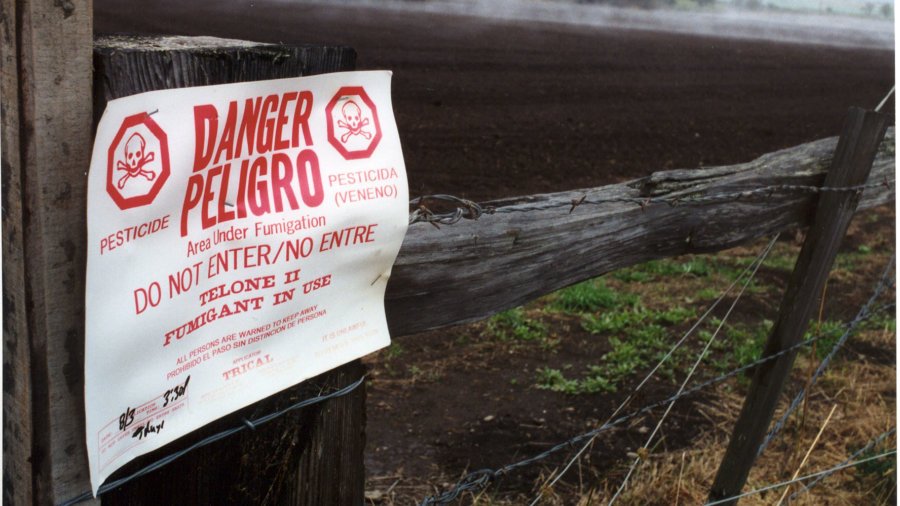In late 2016 Siskiyou Land Conservancy released our Smith River Community Health Assessment, which clearly demonstrates that pesticides used in the cultivation of Easter lily bulbs in, Del Norte County, are impacting the health of people who live in the small town of Smith River.
Yet despite our entreaties, Siskiyou Land Conservancy has received a particularly cold shoulder from officials at the Del Norte County Department of Health and Human Services. This year department officials agreed to meet with us in their Crescent City offices, but the reception was chilly at best. The best that the four health officials in the room could do was to request a significant quantity of further information. And while this additional information clearly was not needed to ascertain the legitimacy of the Health Assessment, nor to understand the devastating nature of the findings, we nonetheless spent significant time and expense to provide it.
Since that the Del Norte Health and Human Services has taken no action, as far as we know, to address the serious health concerns raised by the Assessment. Likewise, officials at the California Department of Pesticide Regulation (70 percent of whose budget is derived from pesticide sales) are ignoring the findings.
You can contact the county Health Department here. Tell them that the county needs to follow up on Siskiyou Land Conservancy’s Smith River Community Health Assessment by enlisting state and federal experts to visit the community and conduct a follow-up health survey.
You can submit complaints to the state here.
For more on the Smith River Community Health Assessment, including the full report, continue reading.
The Smith River Community Health Assessment is the result of a survey mailed in 2016 by Siskiyou Land Conservancy to all residents of the isolated California town of Smith River, which lies near the estuary of the Wild and Scenic Smith River just a few miles south of the Oregon border. Smith River (population 2,000) has been called the “Easter Lily Capital of the World” because all Easter lily bulbs grown for use in North America are produced by just four growers in fields that surround the town and the Smith River estuary.
Smith River lily farmers apply high concentrations of several toxic pesticides. Many of the chemicals are carcinogens, including the fumigants metam sodium and 1,3-dichloropropene, which are used on this remote stretch of rugged California coast in pounds-per-acre concentrations that rival those used in California’s most industrial agricultural counties. Some of the pesticides can cause nerve damage and birth defects, as well as skin rashes, respiratory problems, eye problems, and other health issues.
Over the past three decades state agencies have repeatedly found pesticides from Smith River lily fields contaminating local air, groundwater and surface waters. A 2005 study by the California Environmental Protection Agency found that high concentrations of metam sodium and 1,3-D off-gassed for several days into Smith River neighborhoods. During the 1980s, and in 2002, scientists at the California North Coast Water Quality Control Board found widespread pesticide contamination of Smith River wells. In 2010 and 2013 the Water Board found significant pesticide contamination of streams that flow through lily fields to the Smith River estuary, including residues of 10 different pesticides and a finding of “acute (and) chronic reproductive toxicity” in the food chain that feeds the Smith River’s fabled salmon and steelhead populations.
Most people who responded to the health survey said they live very close to lily fields, many reported drinking water from domestic wells, and nearly half reported children currently or previously attending Smith River Elementary School, which is adjacent to lily fields. Many residents said they began experiencing significant health problems only after moving to Smith River. The survey found that incidents of skin rashes, eye problems, chronic coughs, digestive problems, neurological disorders, heart disease, headaches, cancer and other ailments increased after people moved to the town.
“For years we’ve been hearing from Smith River residents that they believe pesticides are impacting their health,” said Greg King, Executive Director of the non-profit Siskiyou Land Conservancy. “Until now there has never been a systematic assessment of the exposures experienced by residents, their concerns, and their health. This Health Assessment substantially supports the idea that damage being done to local residents by pesticides is real, it is significant, and it is avoidable.”
Siskiyou Land Conservancy is calling for lily growers to enter into a binding agreement to transition away from pesticides, and eventually to adopt organic farming methods. Organic farming is already a thriving industry in Del Norte County. Successful organic farms in the area include Alexandre Dairy, Ocean Air Farms, and beef production by Palmer Westbrook, Inc., among others. (Palmer Westbrook also grows Easter lilies, though not organically.)
“These enterprises demonstrate that organic production can be both sustainable and profitable in Del Norte County,” said King.
Dr. Ken Miller, a physician and SLC director who has studied the impacts of pesticides on human health, said that the health assessment “shows that residents are terribly concerned about the impacts of these pesticides, and they have good reason to be. These are some of the most dangerous and toxic pesticides allowed for use in California, and they are applied in very high concentrations with very little oversight or enforcement from state or local authorities. And now the health assessment demonstrates a high likelihood that they are making people sick.”
King notes that “as a land trust we support farmers, as long as they are farming in a way that isn’t destructive of the community and the natural environment. Siskiyou Land Conservancy has no interest in seeing economic harm come to lily growers. We want them to thrive, but only if they can grow their crops without toxic chemicals.” King said SLC would actively support efforts by lily growers to secure state and federal funding to ease the economic costs of transitioning to organic methods.
Siskiyou Land Conservancy is the only organization dedicated to eliminating excessive pesticide use on bottomlands that surround the vital Smith River estuary.
The Smith River Community Health Assessment was made possible by a grant from the Lisa and Douglas Goldman Fund.

